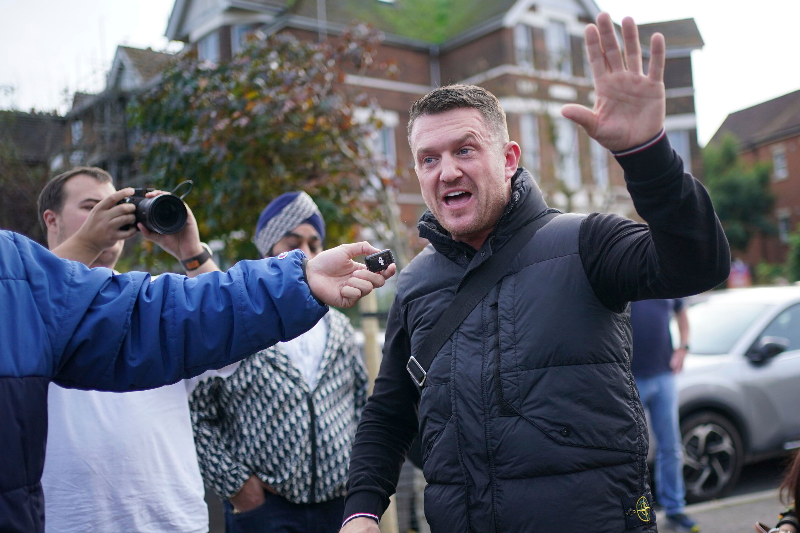

elon musk questions tommy robinson’s 18 month prison sentence amid contempt of court conviction
Following his conviction of contempt of court, Stephen Yaxley-Lennon—also known as Tommy Robinson—was jailed to eighteen months on Monday. Controversial far-right activist Robinson broke a legal injunction pertaining to a 2021 libel case involving Syrian refugee Jamal Hijazi.
London’s High Court’s court ruling forbade Robinson from making defamatory allegations against Hijazi, whom he had accused of abusing and threatening other students, Robinson kept spreading these unfounded accusations in public despite the obvious ban, which led to the latest court case. In addition to violating legal agreements, his acts sparked discussions on free speech and libel in the United Kingdom once more.
Thanks in part for remarks made by tech entrepreneur Elon Musk, Robinson’s sentence has attracted international interest. Renowned for his open opinions on free expression, Musk questioned the harshness of Robinson’s sentence on X (previously Twitter). “Why is he in prison for 18 months?” Musk wondered in a repost of a Robinson’s team post.
Musk had not before ventured into Robinson’s legal affairs. Musk tweeted, “What did he do that was considered terrorism?” after visiting X earlier in July 2024 to show his perplexity over Robinson’s detention Although Musk did not specifically address the details of Robinson’s most recent conviction, his comments have generated international discussion. While some see Musk’s participation as a stand for free expression, critics contend that his remarks compromise the authority of the British court.
Following a video showing Hijazi being attacked by another student at school, Hijazi successfully sued Robinson for slander in 2021. Claiming without proof that Hijazi was the aggressor, Robinson said the Syrian refugee had bullied others. These charges not only denigrated Hijazi but also caused him constant abuse.
Hijazi’s case was decided in his favor by the High Court, which also mandated Robinson pay £100,000 (around $130,000 in damages). The court also issued an explicit direction prohibiting Robinson from repeating the accusations, a directive he obviously disregarded.
Robinson, with a history of dubious behavior and criminal acts, has several legal issues including this most recent sentence. Robinson, the nationalist and anti-Islamist English Defence League (EDL) founder, has often been at the centre of demonstrations, judicial battles, public indignation. His criminal record carries convictions for mortgage fraud, assault, and past contempt of court actions.
Robinson was accused earlier this year of encouraging demonstrations causing disturbances in Northern Ireland and England. The demonstrations tracked the sad murder of three young girls in Southport. Robinson denied any direct participation, but detractors contend that his provocative language added to the public unrest.
Robinson keeps a great impact despite his legal troubles, partly because of his presence on social media. Robinson was banned from Twitter in 2018 for policy violations; he was reinstated in 2022 after Elon Musk bought the platform. Now with more than a million followers on X, Robinson uses the forum to tell his story, organize supporters, and attack the court system.
The relationship between Musk and Robinson gives the argument fresh angles. Some hailed Musk’s purchase of X as a triumph for free expression, but his platforming of controversial people like Robinson has come under fire. By stressing Robinson’s case, Musk has made sure it stays a central focus in debates on how to strike the balance between the rule of law and freedom of expression.
Musk’s comments have sharpened public view even more. Advocates of Robinson see Musk’s remarks as confirmation of their conviction that the justice system unfairly singled out the activist. Critics counter that Musk’s action runs the danger of supporting Robinson’s damaging statements and compromising the judicial system in the United Kingdom.
Musk’s remarks have wider ramifications than only those of Robinson’s situation. Musk is among the most powerful people in the world, hence public perception about him usually has weight. His challenge of Robinson’s sentencing draws attention to the difficulties negotiating free expression in a digital age where lines separating public from private responsibility are progressively blurring.
Musk’s involvement and Robinson’s detention highlight more general problems at the junction of law, journalism, and technology. Robinson’s case serves as a sobering reminder for some about the need for judicial power and the fallout from slander. For some, it stands for a struggle against supposed censorship and an advocacy of more public freedom.
The arguments about Robinson’s case show no indication of stopping as he starts his eighteen-month term. Musk’s remarks have guaranteed that Robinson’s narrative—along with the issues it raises about free speech and responsibility—will remain relevant worldwide.
At least six employees of the U.S. Agency for International Development (USAID) have been put under formal investigation for speaking…
Prince Harry's links to African charitable groups have come under considerable scrutiny after revelations of human rights abuses and internal…
April's unemployment rate in Canada reached 6.9%, the highest in the subsequent period since November 2024. Statistics Canada's data demonstrates…
In a major development, India and the United Kingdom have signed a new agreement providing solutions for Indian workers temporarily…
Former President Donald Trump is taking legal action to strike down one of the topics on the forgotten list of…
As U.S. retailers like Walmart and Costco pursue alternatives to Chinese and Bangladeshi suppliers due to rising tariffs, India's garment…
This website uses cookies.
Read More